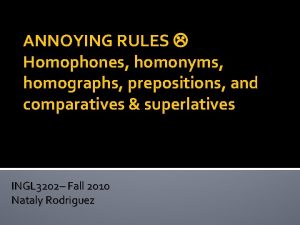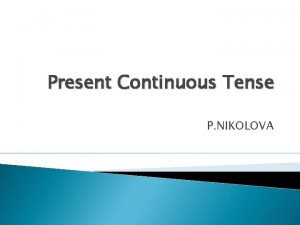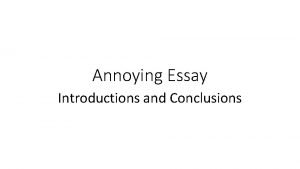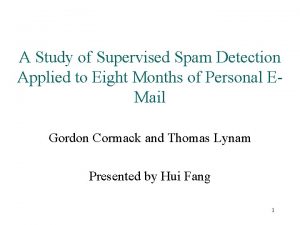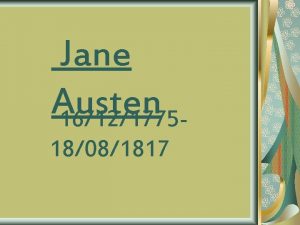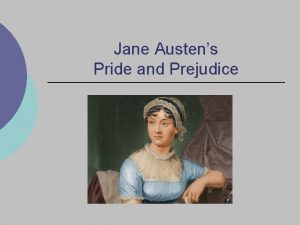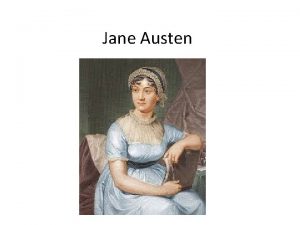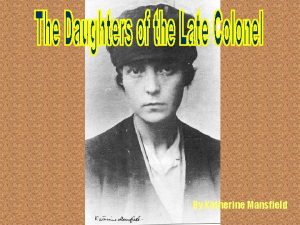Jane Austens Mansfield Park A Series of Annoying











- Slides: 11

Jane Austen’s Mansfield Park A Series of Annoying People Flirt with Each Other. Madness and a Play Ensue.

Jane Austen, 1775 -1817

The Slave Trade in Regency England As of 1772, chattel slavery wasn’t legal in England or Wales, but was tolerated in the British colonies The Atlantic slave trade was abolished by an act of Parliament in 1807 Slavery in British Colonies wasn’t abolished until 1833 with the Slavery Abolition Act

Slave Labor in Antigua settled by the British in 1632 Slave labor flourished under British rule Hugely successful sugar plantations using slave labor British Royal Navy Caribbean Fleet stationed in Antigua during 18 th Century Antiguan slaves emancipated in 1834

Aaaaaand, Infidelity Women could not divorce on grounds of infidelity, but men could Divorce still extremely difficult (requires an Act of Parliament or an annulment) Men would get any children after divorce Very unlikely that Rushworth would have gained the divorce against Maria

Publication History of Mansfield Park Written between 1811 and 1813 at Chawton Cottage Published May 1814 Second edition issued in 1816 Reviewers were critical, but the public loved the novel Highest grossing of all Austen’s novels Published by Thomas Egerton, but Jane moved her works to the care of John Murray (more famous) for the second edition

Overview of Mansfield Park Fanny Price (Perhaps the most tiresome heroine in the history of English literature) Edmund Bertram (Fanny’s sententious clergyman love interest. And first cousin) Mary Crawford (Perky and attractive love interest for Edmund) Henry Crawford (Ugly but devastatingly attractive rake) Maria Bertram (Flirtatious beauty, engaged to Rushworth and attracted to Henry Crawford) Julia Bertram (Equally pretty but less successful sister of Maria. Also attracted to Henry Crawford) Mr. Rushworth (Complete oaf with lots of money, engaged to Maria) Mrs. Norris (Fanny’s aunt. A dreadful person) Sir Thomas Rushworth (Fanny’s proud and terrifying uncle) Lady Bertram (Doped on opiates throughout the whole novel)

Marriage for Property Rather than Love “In all the important preparations of mind [Maria Bertram] was complete; being prepared for matrimony by an hatred of home, restraint, and tranquillity; by the misery of disappointed affection and contempt of the man she was to marry. ”

A Note on Mrs. Norris lives in history as one of the most evil and conniving people in English literature A sadist in every sense of the word The famous cat in the Harry Potter series is named after her

Lovers’ Vows A play by the 18 th-century playwright Elizabeth Inchbald Set in Germany, this play deals with infidelity and sex outside of marriage (not uncommon for 18 thcentury drama) This is also about marriage between financial unequals, which ultimately mirrors the plot in Mansfield Park

Jane Loses Hope This is the last story of the penniless heroine winning the man of her dreams The appearance of infidelity and the ludicrous nature of Fanny and Edmund’s eventual marriage suggests that Jane herself did not believe in her romances Overcoming family opposition to unequal matches seems increasingly impossible in Austen’s novels
 Which of the following learning techniques is least likely
Which of the following learning techniques is least likely Annoy comparative and superlative
Annoy comparative and superlative Present continuous annoying habits
Present continuous annoying habits Annoying story essay
Annoying story essay Annoying ways people use sources
Annoying ways people use sources Annoying create and craft presenters
Annoying create and craft presenters Unofficial annoying
Unofficial annoying Brush mountain park
Brush mountain park Maclaurin series vs taylor series
Maclaurin series vs taylor series Arithmetic sum formula
Arithmetic sum formula Series aiding and series opposing
Series aiding and series opposing Taylor vs maclaurin
Taylor vs maclaurin

